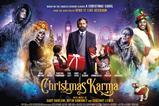Sophie Dianne looks at what we know of Jennifer Alba’s faith journey, and disagrees with her claim that there is a lack of female role models in the Bible.

Jessica Alba is an actress, often underestimated because of her good looks. As an American child with Mexican, French and Danish heritage, she struggled to fit in. These communities viewed Alba as either ‘too white’ or ‘too ethnic.’
After moving to Southern California at the age of 12, she took up acting. Only to be met with similar comments from casting directors. Grappling with adolescent frustration, Alba found solace within the church. Becoming a born again Christian, having been raised as a Catholic.
When she was 15, her acting career finally took off and she landed a role in the US TV drama Chicago Hope; she was to play a girl infected with gonorrhoea. To Alba’s dismay, friends from her Christian youth group disapproved. At this point, her perception started to shift and she began to challenge the ideals she was taught, viewing her friends opinions as twisted.
She found love with a bisexual ballerina, partied at gay clubs and vehemently disagreed with the churches stance on premarital sex.
She found love with a bisexual ballerina, partied at gay clubs and vehemently disagreed with the churches stance on premarital sex. Something she found hypocritical, having been inappropriately pursued by men in her church. The conflict in Alba’s mind grew after further Bible study, she viewed it as a “nice guide” but the supposed lack of female role models bothered her. Now 43, she still believes in God but no longer practises Christianity.
It’s easy to scrutinise the beliefs of others, especially those in the public eye. It’s not for me to cast aspersions. Certain topics will always spark controversial debate within the church, what is undeniable though, are the strong matriarchs we see throughout the bible. Women like Esther, Rahab or Abigail are just a few examples.
Her new film Trigger Warning was released to Netflix on the 21st June. The film centres around a women avenging her Father’s death.
As a Christian women, with feminist values, Alba’s comment struck a nerve. Her new film Trigger Warning was released to Netflix on the 21st June. The film centres around a women avenging her Father’s death. For those who haven’t watched it, this is the synopsis; Special Forces Commando, Parker (Jessica Alba) is on active duty overseas when she gets summoned home, following the sudden death of her father. Now the owner of the family bar, she reconnects with her ex-boyfriend, turned Sheriff Jesse, his hot-headed brother and their powerful father Senator Swann.
Looking to understand the circumstances behind her father’s death, Parker starts investigating but things take a dark turn. And she soon finds herself at odds with a violent gang, running rampant in her hometown. Unsure who to trust, she draws on her commando training and prepares for a fight. Slowly unravelling the truth and attempting to right the wrongs in Swann County.
For someone who believes the Bible to be lacking female role models, there are stark parallels between ‘Parker’ (Jessica Albas character) and Deborah. She was one of the most influential women of the Bible. With her military leadership being the most well known aspect of her story. Under her guidance, the Israelite army rose to victory in the Battle of Mount Tabor.
Read more on the faith of film stars
Actress Rhoda Ofori-Attah: Called to act
‘Mothers have been so devalued’
Actor Rebel Wilson had a vision that changed her future – was it divine intervention?
She was also a notable judge and prophet who was said to hear God’s voice and shared his word with others. During the time of war, she shared a prophecy with warrior, Barak; “you will receive no honour in this venture, for the Lord’s victory over Sisera will be at the hands of a woman.” The female figure in question would be Jael, the wife of a clan leader. She would avenge the Israelites and drive a tent peg through Sisera’s head.
It feels to me that Alba has gotten confused. Both Deborah and Jael were mighty warriors. Rather than taking justice into their own hands - like her character, Deborah and Jael were called upon by God.
He created them to be brave because he knew they were destined to fight on his behalf, for the greater good. In the secular world it has been assumed that biblical women must have been submissive or meek. When in fact they were strong and bold. The key lessons we can learn from them are; to be obedient, courageous and resilient in the face of adversity. These women lived, and they did extraordinary things. And that is a fact.




































1 Reader's comment